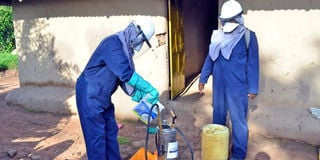Discovery to boost malaria treatment

Technicians with the US President’s Malaria Initiative prepare to conduct indoor residual spraying to eliminate mosquitoes in a Homa Bay home.
What you need to know:
- Use of fixed dose combination in infectious diseases such as HIV/Aids and Hepatitis C virus has performed remarkably well
- The treatment of the disease with single drugs has led to the emergence of resistant
Africa’s malaria control strategy is to advance following a new study.
The study by the Kenya Medical Research Institute (Kemri) Wellcome Trust Research Programme comes as Kenya seeks an alternative malaria treatment given the emergence of resistance to Artemisinin-based Combination Therapies (ACTs) in South East Asia.
The researchers sought to compare standard treatment regimens against double and triple drug combinations to determine their safety, tolerability and the ability.
“This is tremendous progress. We now have viable prevention and treatment options to consider and evaluate (TACTs) in the advent of ACT resistance in Africa,” said Dr Mainga Hamaluba, the head of clinical research at the programme and the lead investigator in the trial.
“The safety, tolerability, and efficacy of arterolane–piperaquine–mefloquine versus arterolane–piperaquine and artemether–lumefantrine was checked,” she added.
“The study demonstrated that in the event of resistance to current ACTs in Africa, triple artemisinin combination therapies (TACTs), rather than double therapies with ACTs can potentially be used safely to prevent, delay or manage uncomplicated malaria in this setting,” said a Kemri official who sought anonymity as he is not authorised to speak to the press.
Uncomplicated malaria
This means that the deployment of the TACTs would delay the development of antimalarial drug resistance due to the decreased chance of resistance to each individual drug.
Scientists at the research facility also believe that the possibility of the multidrug-resistant malaria parasites spreading to the Indian subcontinent and to Sub-Saharan Africa as has been the case with chloroquine and sulfadoxine– pyrimethamine (Fansidar) is an ongoing concern.
Experts say this is compounded by the lack of good alternatives for treatment of what they refer to as “uncomplicated malaria”.
In addition, novel antimalarial compounds that would be used to develop new drugs to combat the multidrug-resistant parasites are not likely to be registered within the next five years.
Dr George Njoroge, the chief scientific adviser at Kenyatta University Teaching, Referral & Research Hospital and a member of the Kemri board praised the findings.
“This is a well-designed study that clearly established that administration of fixed dose combination of arterolane-piperaquine-mefloquine was non-inferior to the standard of care in treatment of uncomplicated falciparum malaria in Kenyan children,” he said.
The use of fixed dose combination in infectious diseases such as HIV/Aids and Hepatitis C virus has performed remarkably well in patient who develop resistance to mono or dual therapies.
“Through the combination of multiple drugs, chances of developing resistance to that therapy are tremendously reduced,” the chief scientist explained.
Fever clearance
According to the World Health Organization, malaria is caused by Plasmodium parasites. The parasites are spread to people through the bites of infected female Anopheles mosquitoes.
The treatment of the disease with single drugs, such as chloroquine, sulfadoxine/pyrimethamine or mefloquine, has led to the emergence of resistant Plasmodium falciparum parasites that lead to the most severe disease.
Artemisinin-based combination therapies are currently recommended by WHO for the treatment of uncomplicated P falciparum malaria.
Artemisinin and semisynthetic derivatives, including artesunate, artemether and dihydroartemisinin, are short-acting antimalarial agents that kill parasites more rapidly than conventional antimalarials, and are active against both the sexual and asexual stages of the parasite cycle.
Artemisinin fever clearance time is shortened to 32 hours as compared with two to three days with older agents.
To delay or prevent the emergence of resistance, artemisinins are combined with one of several longer-acting drugs, which permit elimination of the residual malarial parasites.
As per the most recent World Malaria Report released in 2020 by WHO, there were 229 million cases of malaria in 2019 compared to 228 million in 2018. The estimated number of malaria deaths stood at 409,000 in 2019, compared with 411,000 in 2018.



